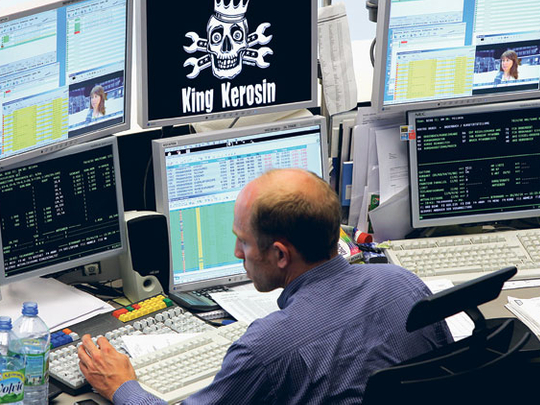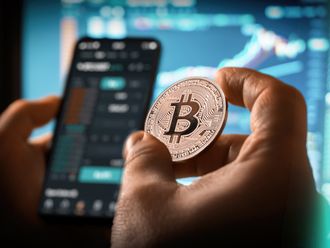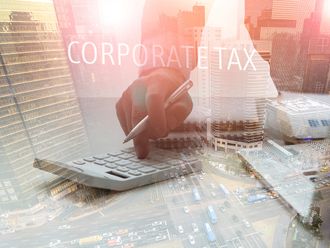
Los Angeles: The global surge in financial markets last year boosted hopes that the recession was ending. But now tumbling stock prices and wild volatility on Wall Street are undermining some of the pillars supporting the economic recovery.
Stocks fell again on Friday, pushing the Dow Jones industrial average down 122 points to 10,136. For all of May the blue-chip index slid 7.9 per cent, its biggest monthly drop since February 2009.
Sinking share prices, along with a jump in interest rates that many companies pay to borrow, threaten to sap executives' confidence — which could make them reluctant or unable to follow through on plans to resume hiring and investing in their businesses, analysts warn.
"You may see corporate managers saying, ‘I'm going to wait a month or two to see how this plays out before hiring,'" Jane Caron, economist at Dwight Asset Management in Burlington, said.
Consumer spending, too, could be at risk as millions of Americans see their 401(k) accounts shrink again.
Although experts perpetually debate how important market gyrations are to the real economy, this time the markets' role may be crucial.
Fewer options
The reason: With short-term interest rates already near zero in the US, Europe and Japan — and with mounting pressure on politicians to rein in budget deficits — policymakers have fewer levers left to pull to help the economy.
That makes healthy financial markets key to maintaining faith in the recovery.
Stocks' slump has been blamed on a confluence of troubles that could slow the world economy: Europe's government-debt crisis and its threat to the global financial system; the risk of environmental catastrophe from the Gulf of Mexico oil spill; and rising tensions between the two Koreas.
To be sure, many Wall Street pros say the stock market was overdue for a pullback after 14 months of heady gains.
And so far, the Dow's loss of 9.5 per cent from the 19-month high it reached in late April is relatively modest as sell-offs go.
The index still is up 55 per cent from March 2009. But the unrelenting volatility has shocked even market veterans. The Dow has posted triple-digit losses or gains in 14 of 20 trading sessions this month.
"The volatility really sums up how on edge everyone is" about the economy and financial system, Ryan Detrick, an analyst at Schaeffer's Investment Research in Cincinnati said.
The swings also have been blamed on computerised trading programmes that now are under review by market regulators.
Most worrisome is that the market mayhem is bringing back memories of fall 2008, when stocks plummeted as bank lending froze after the collapse of brokerage Lehman Bros.
Anticipating that the economy would crumble, many companies began slashing jobs to offset falling sales and profit.
But those massive layoffs helped make a deep recession a self-fulfilling prophecy. The US lost a net 2.4 million jobs just from September to December 2008.
Cost-cutting measures
One risk now is that executives could be tempted to start a new round of cost-cutting if they believe the markets are signalling a "double-dip" recession.
Andrew Busch, public policy strategist at BMO Capital Markets in Chicago, said that in meetings with business owners and executives around the country in May he found that "people are still cautiously optimistic. I don't think they're ready to start cutting again." Financial markets' swings "may, at worst, delay the number of people they want to add" to staff, he said.
For now, most analysts still expect the US economy to grow in the second half of the year, though at a slower pace than in the first half. Economic data in recent weeks — including reports on consumer confidence, new-home sales and manufacturing activity — have largely supported the idea that the US recovery is intact.
But for some companies, a desire to boost spending could be foiled by an inability to get needed financing. While stocks' swoon has grabbed the headlines, credit markets also have been roiled as Europe's debt woes have driven up interest rates on short-term bank loans and on "junk" bonds — those rated below investment-grade.
Because relatively few companies have investment-grade credit ratings, the junk-bond market is where most US firms borrow to raise long-term funds.
Postponed offerings
The rising cost of new debt has forced at least seven companies to postpone junk-bond offerings planned for this month, including Regal Cinemas and clothing maker Jones Apparel.
For many firms, the junk-bond market's upheaval "will have a much more damaging effect on capital spending" than the stock market's slide, Srinivas Thiruvadanthai, research director at the Levy Forecasting Center in New York said.
With consumer spending still accounting for about two-thirds of US economic activity, average Americans' reaction to markets' turmoil will weigh heavily on the outlook.
For consumers, the tumult has had two silver linings. One is a sell-off in commodities that has pulled oil prices down 15 per cent since April, hacking gasoline prices too.
Because the top 20 per cent of households by income are estimated to account for 40 per cent of consumer spending, a continuing plunge in financial markets could significantly erode retail sales.
To preserve the affluent class' spending power, "It's very important that the [stock market] correction comes to an end soon," Mark Zandi, chief economist at Moody's Economy.com said.











